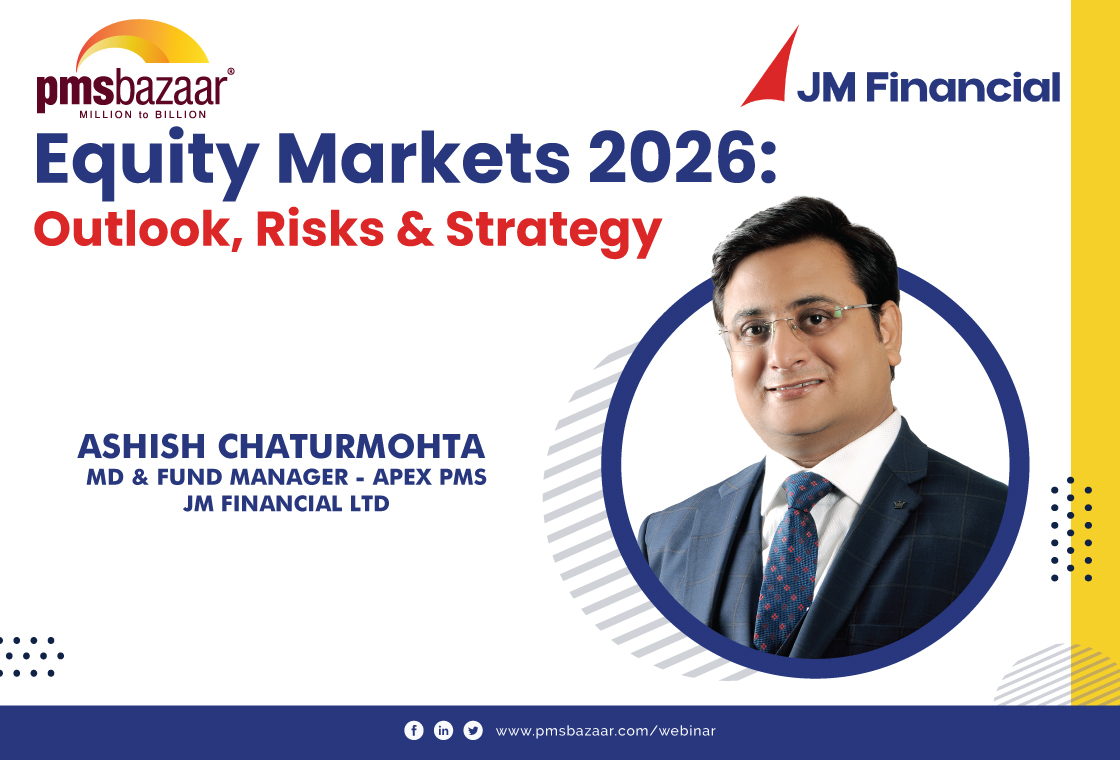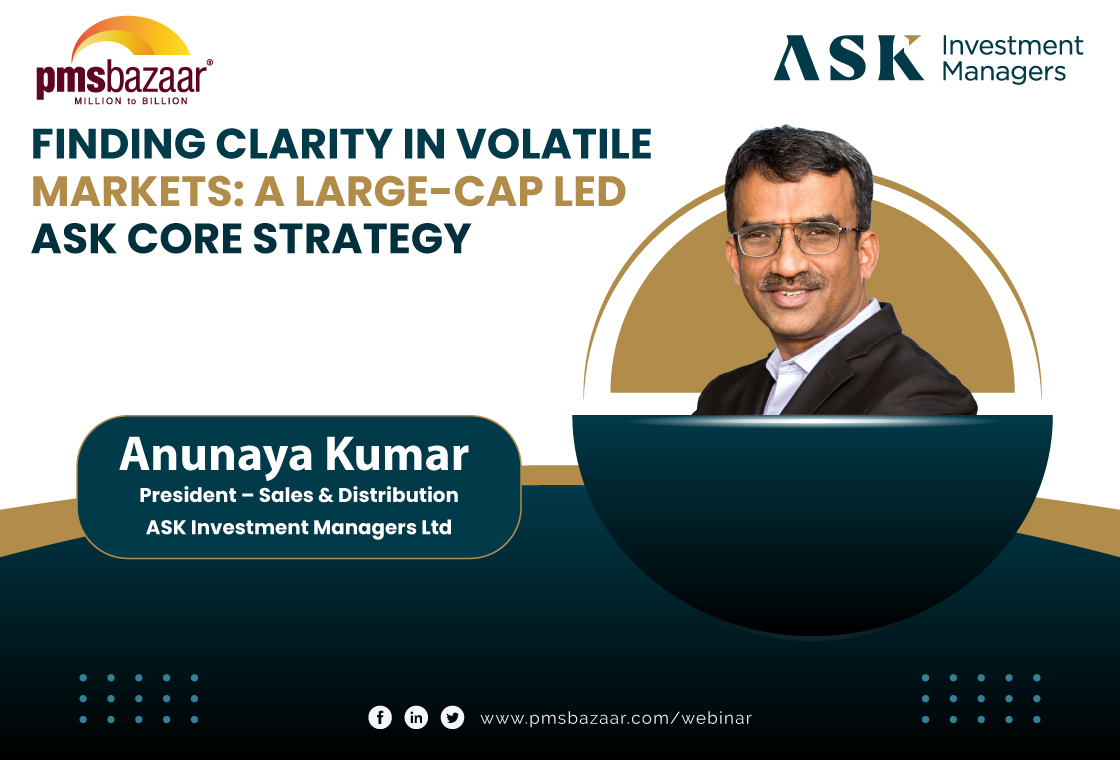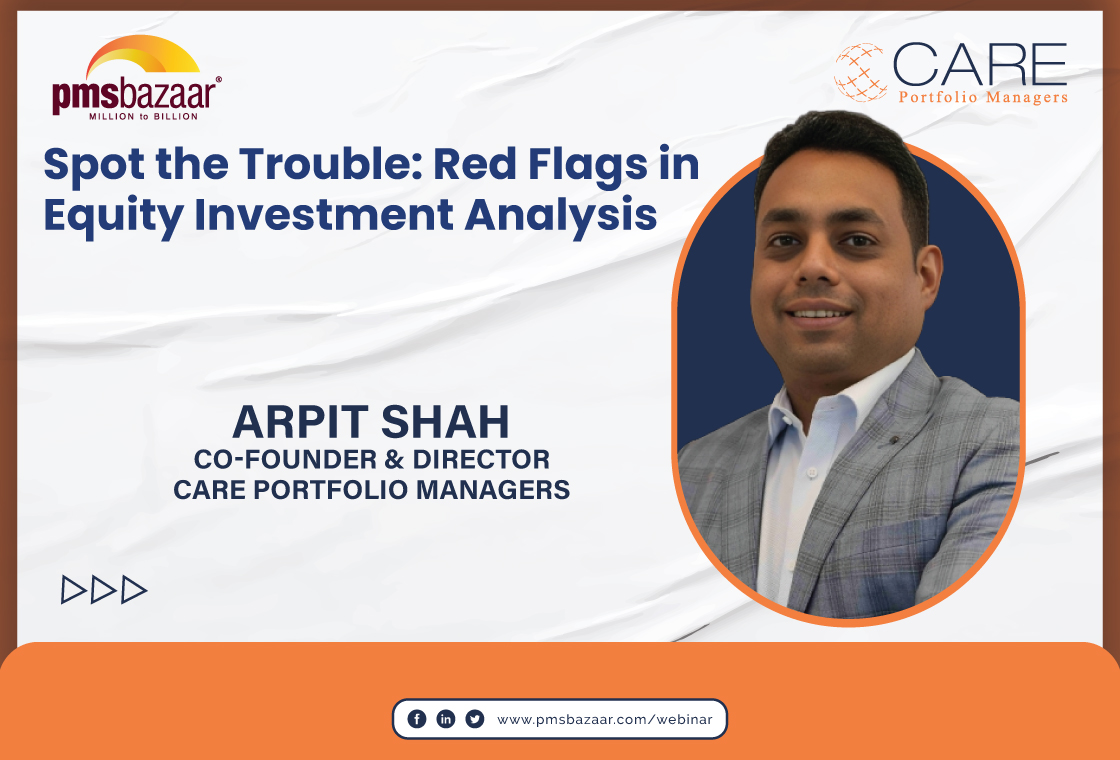This blog summarises the Abakkus Four2Eight Opportunities Fund, based on insights from a webinar titled ‘ABAKKUS FOUR2EIGHT- Mid to Late Stage PE Opportunities Fund’

Ankit Aggarwal, Fund Manager of Private Equity at Abakkus Asset Managers LLP, participated in a webinar titled ‘ABAKKUS FOUR2EIGHT- Mid to Late Stage PE Opportunities Fund’ organised by PMS Bazaar. The webinar highlighted the Abakkus Four2Eight Fund and explored India's growth potential, focusing on late-stage investments and the fund's sector-agnostic approach.
About the fund and philosophy
Aggarwal introduced the Abakkus Four2Eight Opportunities Fund, a newly launched Category II Alternative Investment Fund (AIF). The fund's name, ‘Four2Eight,’ represented India's projected economic growth from $4 trillion to $8 trillion in the next 7-8 years. The fund was designed to leverage this growth trajectory, focusing on four key drivers: democracy, domestic consumption, demographics, and digitalisation.
The Abakkus Four2Eight Fund's investment philosophy aligned with the strategies employed in public markets, emphasising fundamental research, a bottom-up approach, and generating alpha over market performance while avoiding investments in trending sectors. The fund primarily targeted mid to late-stage companies preparing for IPOs within six months to two and a half years. Additionally, the fund considered secondary opportunities where existing funds were nearing the end of their lifecycle, and PIPE (Private Investment in Public Equity) transactions requiring growth capital. The fund's core principle was to invest exclusively in profitable companies with proven business models, strong management teams, and a need for growth capital before going public.
Why invest in companies in the late-stage growth phase?
Aggarwal highlighted the advantages of late-stage investing, emphasising that businesses at this stage typically possessed proven business models, strong unit economics, and required growth capital for expansion before going public. This strategy was expected to generate favourable risk-adjusted returns. Companies benefited from access to growth capital and strategic expertise, while promoters and private equity funds gained liquidity. As a Category II fund, Abakkus had the flexibility to sell shares post-listing without lock-in periods.
The fund maintained a sector-agnostic approach, aiming to invest in companies that would benefit from India's economic growth. However, the fund adhered to a core philosophy of avoiding loss-making businesses. At the time of the webinar, the fund was evaluating five to six companies across various sectors, including mining, aluminium engineering, defence, financial services, and manufacturing. Two companies were in the advanced stages of due diligence: a mining EPC business with a strong order book, double-digit EBITDA margins, and impressive return ratios, and a high-end aluminium engineering products company supplying the aviation, defence, and renewable sectors, also demonstrating strong financial metrics.
Deal sourcing
Aggarwal elaborated on the Abakkus Four2Eight fund's unique deal-sourcing strategy, highlighting the company's strong presence in equity markets and established relationships with corporates, family offices, and public market investors. The fund leveraged an extensive network of investment bankers, boutique advisors, and private equity funds to source quality transactions. The fund's investment process followed the MEETS framework, emphasising investments in high-quality businesses with competent management and reasonable valuations, with a focus on delivering timely and profitable exits for investors.
Aggarwal drew parallels between the current state of India's private equity market and the public markets two decades prior, where foreign institutional investors (FIIs) dominated. He expressed optimism that the domestic private equity landscape would evolve similarly to the public markets, with increased local participation benefiting Indian investors.
Real-World Examples
To provide further clarity on their investment approach, Aggarwal shared specific examples of companies currently under consideration. These examples highlighted the key characteristics they seek in potential investments:
Mining EPC Business:
This company possesses a robust order book, with orders valued at five times their previous year's revenue, indicating strong demand for their services. They also boast double-digit EBITDA margins and impressive return ratios, demonstrating profitability and efficiency.
Aluminium Engineering Products Company:
This company supplies high-quality products to reputable clients in the defence, aviation, and renewable energy sectors. They benefit from favourable margins and return ratios, highlighting their strong market position and efficient operations.
These examples underscore their preference for reasonably priced companies with strong financial performance and a clear growth trajectory. They seek companies that operate in sectors poised for growth, even if these sectors are not yet widely recognised as "hot" investment opportunities.
Valuation and Exit Strategies
The fund's valuation strategy involves buying at a discount compared to listed companies, aiming to acquire undervalued companies and gain significant returns when they eventually list.
Their exit strategy is flexible, allowing exits before, during, or after an IPO depending on the circumstances. They prioritise enhancing shareholder value and have protective provisions in place, such as buybacks by the company or promoters, to ensure exit strategies even if an IPO is delayed or withdrawn. Aggarwal emphasised a fair market value framework allowing them to sell their stake when the market reaches their determined fair value, maximising returns for their investors
Outlook on the Indian IPO Market
While acknowledging the inherent difficulty in predicting market movements, Aggarwal maintained a positive outlook on the Indian IPO market for the foreseeable future. He cited the following factors contributing to his optimism:
Increasing Domestic Savings: A significant portion of domestic savings is being channelled into equities, providing a steady flow of capital into the market.
The attractiveness of High-Quality Companies: Companies with strong fundamentals, a proven track record of profitability, and a compelling growth story will continue to attract investor interest, regardless of market fluctuations.
However, he also advised investors to temper their return expectations given the current high valuations in the market. This cautious optimism reflected a balanced view of the market's potential, recognising both the opportunities and the need for prudence.
Other points of discussion
The webinar also covered topics such as identifying opportunities in high-growth sectors, navigating the pre-IPO journey, managing the transition to public markets, ensuring the right market perception, traditional IPOs vs. SPACs, managing cross-sourcing deals and co-investments, navigating investor expectations, missed investment opportunities, and early entry in investments.
Aggarwal also addressed the implications of recent tax changes on private equity investments. He believes that the reduction in long-term capital gains tax from 20% to 12.5% without indexation creates a more favourable environment for investors in unlisted securities. This change not only enhances the after-tax returns for investors but also makes it easier for firms like Abakkus to market their unlisted funds.
The webinar offered insights on each of these topics and addressed questions from the audience.
Disclaimer: This Blog is made for informational purposes only and does not constitute an offer, solicitation, or an invitation to the public in general to invest in the Fund mentioned. Investors must read the detailed Private Placement Memorandum (PPM), including the risk factors, and consult your Financial Advisor before making any investment decision/contribution to AIF. This Blog has been prepared for general guidance, and no person should act upon any information contained in the document. The fund-specific information, if any, mentioned in this blog is neither verified by SEBI nor by PMS Bazaar and does not guarantee future performance. PMS & AIF Investments are subject to various risks, including but not restricted to market volatility, liquidity risk, and credit risk. PMS Bazaar advises the viewers to consult their respective SEBI-registered investment advisor before making any investment decisions.
Recent Blogs

Equity Markets 2026: Outlook, Risks and Strategy
PMS Bazaar recently organized a webinar titled “Equity Markets 2026: Outlook, Risks and Strategy,” which featured Mr. Ashish Chaturmohta, MD & Fund Manager – APEX PMS, JM Financial Limited. This blog covers the important points shared in this insightful webinar.

MICRO CAPS: The Dark Horses of the Indian Equity Market
PMS Bazaar recently organized a webinar titled “MICRO CAPS: The Dark Horses of the Indian Equity Market,” which featured Mr. Rishi Agarwal and Mr. Adheesh Kabra, both Co-Founders and Fund Managers, Aarth AIF. This blog covers the important points shared in this insightful webinar.

Finding Clarity in Volatile Markets: A Large-Cap Led ASK CORE Strategy
PMS Bazaar recently organized a webinar titled “Finding Clarity in Volatile Markets: A Large-Cap Led ASK CORE Strategy,” which featured Mr.Anunaya Kumar, President – Sales and Distribution ASK Investment Managers Limited. This blog covers the important points shared in this insightful webinar.
.jpg)
Passively Active Investing — A Modern Investor’s Lens on ETF-Based PMS
PMS Bazaar recently organized a webinar titled “Passively Active Investing — A Modern Investor’s Lens on ETF-Based PMS,” which featured Mr. Karan Bhatia, Co-Founder and Co-Fund Manager , Pricebridge Honeycomb ETF PMs. This blog covers the important points shared in this insightful webinar.

Spot the Trouble: Red Flags in Equity Investment Analysis
PMS Bazaar recently organized a webinar titled “Spot the Trouble: Red Flags in Equity Investment Analysis,” which featured Mr. Arpit Shah, Co-Founder & Director, Care Portfolio Managers. This blog covers the important points shared in this insightful webinar.

Long-Only AIFs Rebound Sharply in October; Long-Short Strategies Lag Despite Lower Volatility
106 long-only AIFs averaged 3.68% vs 32 long-short AIFs at 2.7%; only 24–31% of funds beat key indices

Markets log strongest monthly gains in 7 months; PMS performance turns near-uniform in October
Nifty 50 TRI gained 4.62%, BSE 500 TRI rose 4.27%; 415 of 427 equity PMSes ended positive

How SMEs are Shaping India’s Investment Landscape?
PMS Bazaar recently organized a webinar titled “How SMEs are Shaping India’s Investment Landscape?” which featured Mr. Shrikant Goyal, Fund Manager, GetFive Opportunity Fund.

